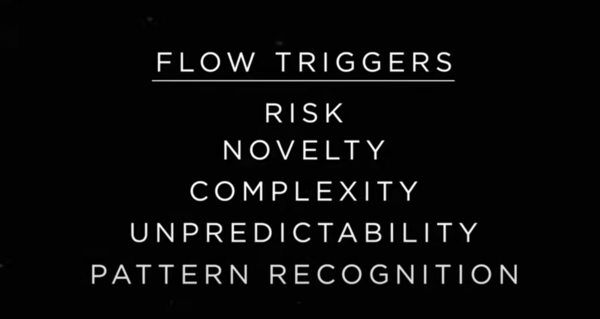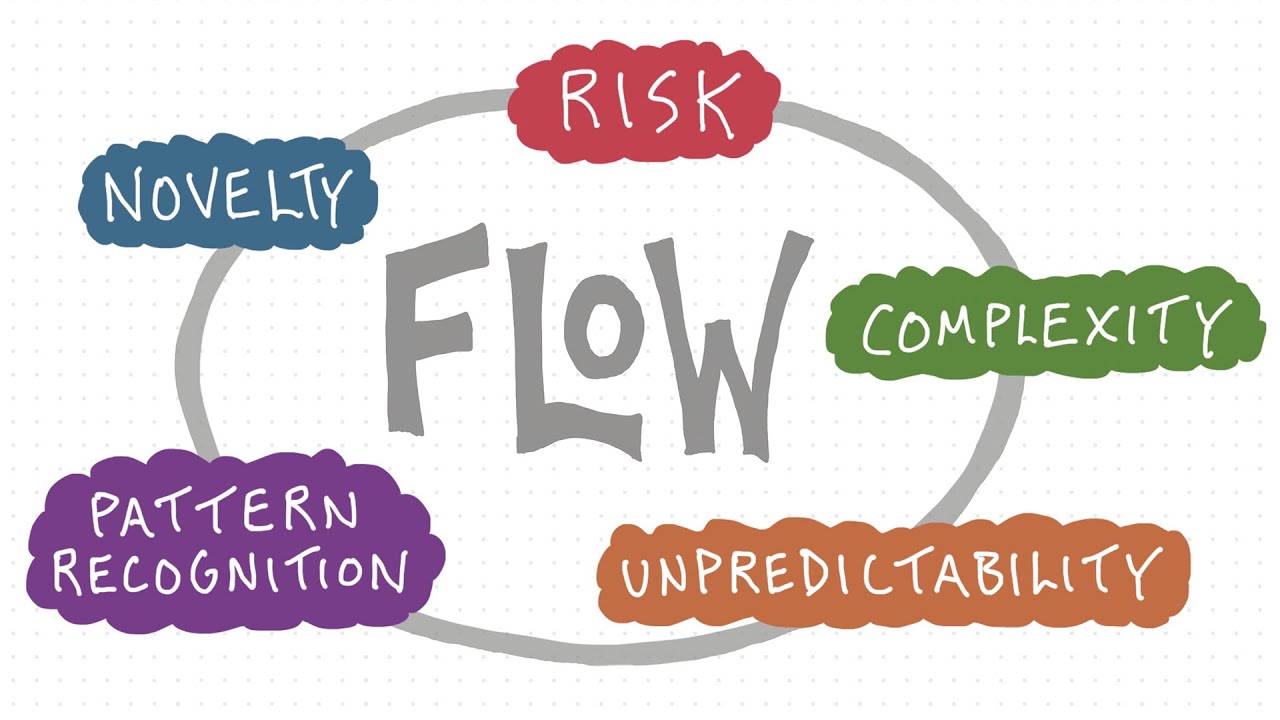What is flow?
“Moments of wrapped attention and absorption in the present moment.”
“Flow is a state of full task engagement that is accompanied with low-levels of self-referential thinking.”
“Flow is a state of being in which one fully engages with the current task, blocking out all distractions and feeling mentally awake and productive.”
Flow is highly trainable. Focusing on the present moment is affected by dopamine levels. These applicable triggers are great sources of dopamine and can help one enter into the flow state:

When the risk is involved, there’s a rush. Adrenaline, danger, suspense- the mind reacts to these stimulations with heightened sensitivity. This is the primary flow trigger for professional athletes in competitive sports. And while many college students joke about how they do their best work last minute- it could be reasonably argued that the increased risk of failing a late assignment helps them to focus on their work.
Adding novelty to your routine can help to stimulate your mind. Although I love my frequently-visited coffee shops, I do find that when I try out a new place for doing homework or studying, I feel more alert and able to focus simply from being in a new environment. Novelty can come in a range of forms and intensities- different music, an unfamiliar latte flavor, or even just a brand new pen can help to mold a novel experience for your brain to latch onto.
The brain is a problem-solving machine. It’s always looking for problems to solve and how to compare the information. Complex problems engage the brain in a new and challenging way- ultimately releasing dopamine. Complexity can usually be found in the task at hand; this is why some work may seem mundane and uninteresting – because the brain isn’t being properly stimulated by it. I find complexity to be rewarding when I’m able to find a creative solution to the problem. One should be careful to not dwell on a problem for too long or they will be left feeling drained and mentally worn out. Switch up the task and give your brain the nourishment to solve problems effectively.
Similar to risk, unpredictability alerts the brain and keeps it guessing. When the brain knows all that is going on, it gets bored. Switching up your routine is an easy way to introduce unpredictability (and potentially novelty as well). I’ve started inserting random walks into my studying sessions- whereas I would usually just sit and do homework in one giant sitting, I now try to break up the session with unplanned, spontaneous walks or stretches (exercise, though not one of the primary flow triggers, also releases dopamine).
“Pattern recognition? But that’s the opposite of novelty/unpredictability.” Yes- blame the brain. While new and exciting experiences activate the brain, there’s a balance to be had. The brain is constantly seeking patterns. Every bit of information that comes in can be a lot to process- so to save effort and energy (that can be redirected into the focus of a flow state) the brain uses patterns as a shortcut for saving mental energy. A great example of this mentioned in Matt’s video is how he edits scripts before writing new ones. As he explains, a blank page can be an overwhelming task to start the day off to, but editing a script from the day before is much easier to get into because the pattern is already there. Once you’re warmed up from small, familiar tasks, the daunting blank-page tasks will seem much more manageable.

Entering the flow state is a process; it’s worth being mindful of your environment and how you set yourself up for task production so that you can better serve yourself. The brain is an amazing tool that capable of prioritizing select information- it just needs our guidance to effectively do so. Set your mind up for success and it will surely deliver.
Inspiration for this article, along with some more great examples and insights can be found in this video by Matt D’Avella. Stven Kotler’s website can be found here. Reference article by Guy Cheron with Frontiers in Psychology.
Want to find out how to best enter your own state of flow? Take the flow profile quiz.






